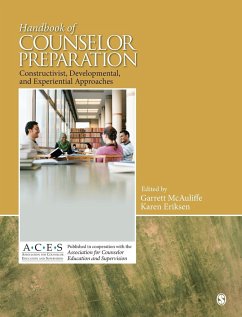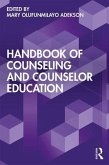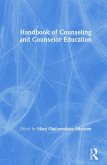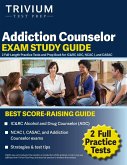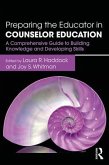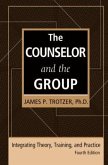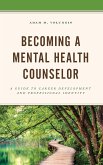Handbook of Counselor Preparation
Constructivist, Developmental, and Experiential Approaches
Herausgeber: Eriksen, Karen; American Contractor's Exam Services; McAuliffe, Garrett
Handbook of Counselor Preparation
Constructivist, Developmental, and Experiential Approaches
Herausgeber: Eriksen, Karen; American Contractor's Exam Services; McAuliffe, Garrett
- Gebundenes Buch
- Merkliste
- Auf die Merkliste
- Bewerten Bewerten
- Teilen
- Produkt teilen
- Produkterinnerung
- Produkterinnerung
Published in cooperation with the Association of Counselor Education and Supervision (ACES) This definitive single-volume guide is the first of its kind on teaching and developing counselor educator programs that embrace constructivist and developmental theory. Leading scholars and experts offer practical advice on teaching courses in every area of counseling practice. As a result, the book is ideal for current and future counselor educators and supervisors as well as faculty in other helping professions. The authors seek to inspire educators to empower and involve, to risk "losing control"…mehr
Andere Kunden interessierten sich auch für
![Handbook of Counseling and Counselor Education Handbook of Counseling and Counselor Education]() Handbook of Counseling and Counselor Education151,99 €
Handbook of Counseling and Counselor Education151,99 €![Handbook of Counseling and Counselor Education Handbook of Counseling and Counselor Education]() Handbook of Counseling and Counselor Education369,99 €
Handbook of Counseling and Counselor Education369,99 €![Addiction Counselor Exam Study Guide Addiction Counselor Exam Study Guide]() Elissa SimonAddiction Counselor Exam Study Guide59,99 €
Elissa SimonAddiction Counselor Exam Study Guide59,99 €![Preparing the Educator in Counselor Education Preparing the Educator in Counselor Education]() Preparing the Educator in Counselor Education57,99 €
Preparing the Educator in Counselor Education57,99 €![The Professional Counselor The Professional Counselor]() Shannon HodgesThe Professional Counselor52,99 €
Shannon HodgesThe Professional Counselor52,99 €![The Counselor and the Group, fourth edition The Counselor and the Group, fourth edition]() James P. TrotzerThe Counselor and the Group, fourth edition83,99 €
James P. TrotzerThe Counselor and the Group, fourth edition83,99 €![Becoming a Mental Health Counselor Becoming a Mental Health Counselor]() Adam M. VolungisBecoming a Mental Health Counselor123,99 €
Adam M. VolungisBecoming a Mental Health Counselor123,99 €-
-
-
Published in cooperation with the Association of Counselor Education and Supervision (ACES) This definitive single-volume guide is the first of its kind on teaching and developing counselor educator programs that embrace constructivist and developmental theory. Leading scholars and experts offer practical advice on teaching courses in every area of counseling practice. As a result, the book is ideal for current and future counselor educators and supervisors as well as faculty in other helping professions. The authors seek to inspire educators to empower and involve, to risk "losing control" over subject matter, to hear student voices, to pose dilemmas, and to challenge their own assumptions in the presence of their students using constructivist, developmental, and experiential thinking and strategies. Key Features: Coverage of the foundations of constructivist and developmental teaching in Part One includes the pedagogies of the classic thinkers in the teaching field, namely John Dewey, Lawrence Kohlberg, and David Kolb, explicit guidelines for teaching, the phases of counselor development, and a primer on six common teaching strategies. Carefully-crafted guides for teaching in 17 content areas in the counselor education curriculum provide readers with practical "how to" information. Innovative ideas for counselor education in Part Three offer readers keys to evaluating outcomes in counselor education, expanding technology in the field, and boldly infusing narrative theory into counselor education. Exercises in constructivist, developmental, and experiential approaches appear in chapters to give readers an opportunity to apply what they have just learned.
Hinweis: Dieser Artikel kann nur an eine deutsche Lieferadresse ausgeliefert werden.
Hinweis: Dieser Artikel kann nur an eine deutsche Lieferadresse ausgeliefert werden.
Produktdetails
- Produktdetails
- Verlag: Sage Publications, Inc
- Seitenzahl: 464
- Erscheinungstermin: 1. Dezember 2010
- Englisch
- Abmessung: 260mm x 208mm x 29mm
- Gewicht: 1209g
- ISBN-13: 9781412991773
- ISBN-10: 1412991773
- Artikelnr.: 30584285
- Herstellerkennzeichnung
- Libri GmbH
- Europaallee 1
- 36244 Bad Hersfeld
- gpsr@libri.de
- Verlag: Sage Publications, Inc
- Seitenzahl: 464
- Erscheinungstermin: 1. Dezember 2010
- Englisch
- Abmessung: 260mm x 208mm x 29mm
- Gewicht: 1209g
- ISBN-13: 9781412991773
- ISBN-10: 1412991773
- Artikelnr.: 30584285
- Herstellerkennzeichnung
- Libri GmbH
- Europaallee 1
- 36244 Bad Hersfeld
- gpsr@libri.de
Garrett J. McAuliffe is University Professor of Counselor Education at Old Dominion University in Norfolk, Virginia. He received his doctorate in counseling from the University of Massachusetts at Amherst, his master′s degree from the University of Albany, and his bachelor′s degree in literature from Queens College in New York City. McAuliffe's work focuses on culture, constructivism, counselor education, and career, and he has written or co-written six books on topics ranging from working with troubled youth to culturally alert counseling. He has created models for cultural de-centering and health-oriented client assessment. He spent thirteen years as a community college and university counselor, and prior to that, he served as a public school teacher in New York. Dr. Karen Eriksen, founder/CEO of the Eriksen Institute, has spent the last 35 years successfully transforming organizations by inspiring leaders to become intentional and ethical team builders; more creative and innovative problem solvers; and outstanding communicators, influencers, and conflict resolvers. She is an expert change agent and instructional designer; award winning trainer, teacher, presenter, and author; soft skills and systems expert, and accomplished leader. As a result of her trainings, supervision, instructional design, group facilitation, and coaching, leaders and employees regain their enthusiasm and effectiveness, and skillfully transform their organizations toward improved morale, increased innovation, and optimal productivity and profitability. Her primary work has been designing and conducting leadership training with follow up coaching in the health care, government, and education industries. She is also committed to encouraging organizations to aspire toward the optimal in values and ethical decision making. Dr. Eriksen recently published the book, Perfect Phrases for Creativity and Innovation. "The Association for Counselor Education and Supervision" (ACES) emphasizes the need for quality education and supervision of counselors in all work settings. Through the accreditation process and professional development activities, ACES strives to continue to improve the education, credentialing and supervision of counselors. The association strives to encourage publications on current issues, relevant research, proven practices, ethical standards and conversations on related problems. Persons who are engaged in the professional preparation of counselors will find leadership through ACES. The ultimate purpose of the Association is to advance counselor education and supervision in order to improve the provision of counseling services in all settings of society."
Preface - Garrett J. McAuliffe
PART I: FOUNDATIONS: CONSTRUCTIVISM, DEVELOPMENT, CULTURE, AND TEACHING
1: Constructing Counselor Education - Garrett J. McAuliffe
2: Deep Learning: The Work of Dewey, Kohlberg, and Kolb - Garrett J.
McAuliffe
3: Guidelines for Constructivist-Developmental Counselor Education -
Garrett J. McAuliffe
4: Who Are the Learners? Phases of Counselor Development - Garrett J.
McAuliffe
5: A Primer on Six Key Teaching Strategies: Lecturing, Discussion,
Questioning, Small Groups, Reading and Writing, and Improvisation - Garrett
J. McAuliffe
PART II: A GUIDE TO INDIVIDUAL COURSES AND TOPICS IN THE COUNSELOR
EDUCATION CURRICULUM
6: Teaching Introduction to Counseling - Yvonne L. Callaway, Sue A. Stickel
7: Constructing the Counseling Skills Course- - Karen Eriksen, Garrett J.
McAuliffe
8: Teaching Theories for the Constructivist Counselor - Donald Strano,
Michael Ignelzi
9: Teaching Assessment and Testing - Yegan Pillay,Sheri Pickover
10: Teaching Group Counseling: A Constructivist Approach - Karen Eriksen,
Bill Bruck
11: Teaching Research Methods for Counselors - Varunee Faii
Sangganjanavanich, Linda L. Black
12: Teaching Social and Cultural Issues in Counseling - Aretha Marbley,
Janee Steele, Garrett J. McAuliffe
13: Teaching Lifespan Development - Jean Sunde Peterson, Karen Eriksen
14: Teaching Career Development - Judy Emmett, Garrett J. McAuliffe
15: Creating Courses in Constructivist Supervision - Seth Olson, Brian
Mistler, James S. Korcuska
16: Creating Constructivist Courses in Practicum and Internship - James S.
Korcuska and Seth Olson
17: Teaching the Diagnosis and Treatment Planning Course - Victoria E.
Kress, Karen Eriksen
18: Teaching Counseling Children and Adolescents - Toni R. Tollerud, Ann
Vernon
19: Teaching Family Counseling - Montserrat Casado-Kehoe, Angela R. Holman,
Charles R. McAdams
20: School Counseling Preparation Within a Constructivist Framework - Tim
Grothaus, James Devlin, Christopher Sink, Cher Edwards
21: Teaching Community Agency/Mental Health Counseling and Crisis
Intervention - Sarah E. Peterson, Rick A. Myer
22: Teaching Substance Abuse/Addictions Counseling - Brigid Noonan, Scott
Wykes
PART III: INNOVATIVE PROGRAM PRACTICES
23: What Do Students Know and What Can They Do? Assessing Competence in
Counselor Education - Debra C. Cobia, Jamie S. Carney, David M. Shannon
24: The Use of Technology in Counselor Education and Supervision - Lisa L.
Buono, Gail E. Uellendahl, Lorraine J. Guth, Claire J. Dandeneau
25: Narrative/Post-Modern Perspectives on Counselor Education - Kathie
Crocket, Elmarie Kotze
PART IV: CONCLUSIONS
26: Implementing Constructivist Counselor Education: Pushing the Zone of
Proximal Development - Garrett McAuliffe, Karen Eriksen
Teaching Introduction to Counseling - Garrett McAuliffe, Karen Eriksen
Teaching Theories for the Constructivist Counselor - Garrett McAuliffe,
Karen Eriksen
Teaching Assessment and Testing - Garrett McAuliffe, Karen Eriksen
Teaching Group Counseling: A Constructivist Approach - Garrett McAuliffe,
Karen Eriksen
Teaching Research Methods for Counselors - Garrett McAuliffe, Karen Eriksen
Teaching Social and Cultural Issues in Counseling - Garrett McAuliffe,
Karen Eriksen
Teaching Lifespan Development - Garrett McAuliffe, Karen Eriksen
Creating Courses in Constructivist Supervision - Garrett McAuliffe, Karen
Eriksen
Creating Constructivist Courses in Practicum and Internship - Garrett
McAuliffe, Karen Eriksen
Teaching the Diagnosis and Treatment Planning Course - Garrett McAuliffe,
Karen Eriksen
Teaching Counseling Children and Adolescents - Garrett McAuliffe, Karen
Eriksen
Teaching Family Counseling - Garrett McAuliffe, Karen Eriksen
School Counseling Preparation Within a Developmental Constructivist
Framework - Garrett McAuliffe, Karen Eriksen
Teaching Community Agency/Mental Health Counseling and Crisis Intervention
- Garrett McAuliffe, Karen Eriksen
Teaching Substance Abuse/Addictions Counseling - Garrett McAuliffe, Karen
Eriksen
What Do Students Know and What Can They Do? Assessing Competence in
Counselor Education - Garrett McAuliffe, Karen Eriksen
The Use of Technology in Counselor Education - Lisa Buono, Gail Uellendahl,
Lorraine Guth, Claire Dandeneau
Narrative/Post-Modern Perspectives on Counselor Education - Kathie Crocket,
Elmarie Kotze
Teaching Career Development - Garrett McAuliffe, Judy Emmett
Constructing Counselor Education - Garrett McAuliffe
Foundations for Teaching and Learning: The Work of Dewey, Kohlberg, and
Kolb - Garrett McAuliffe
Who Are the Learners? Phases of Counselor Development - Garrett McAuliffe
A Primer on Six Key Teaching Strategies: Lecturing, Discussions, Reading,
Writing, Small Group Discussion, and Improvisations - Garrett McAuliffe
Teaching Counseling Skills - Garrett McAuliffe, Karen Eriksen
PART I: FOUNDATIONS: CONSTRUCTIVISM, DEVELOPMENT, CULTURE, AND TEACHING
1: Constructing Counselor Education - Garrett J. McAuliffe
2: Deep Learning: The Work of Dewey, Kohlberg, and Kolb - Garrett J.
McAuliffe
3: Guidelines for Constructivist-Developmental Counselor Education -
Garrett J. McAuliffe
4: Who Are the Learners? Phases of Counselor Development - Garrett J.
McAuliffe
5: A Primer on Six Key Teaching Strategies: Lecturing, Discussion,
Questioning, Small Groups, Reading and Writing, and Improvisation - Garrett
J. McAuliffe
PART II: A GUIDE TO INDIVIDUAL COURSES AND TOPICS IN THE COUNSELOR
EDUCATION CURRICULUM
6: Teaching Introduction to Counseling - Yvonne L. Callaway, Sue A. Stickel
7: Constructing the Counseling Skills Course- - Karen Eriksen, Garrett J.
McAuliffe
8: Teaching Theories for the Constructivist Counselor - Donald Strano,
Michael Ignelzi
9: Teaching Assessment and Testing - Yegan Pillay,Sheri Pickover
10: Teaching Group Counseling: A Constructivist Approach - Karen Eriksen,
Bill Bruck
11: Teaching Research Methods for Counselors - Varunee Faii
Sangganjanavanich, Linda L. Black
12: Teaching Social and Cultural Issues in Counseling - Aretha Marbley,
Janee Steele, Garrett J. McAuliffe
13: Teaching Lifespan Development - Jean Sunde Peterson, Karen Eriksen
14: Teaching Career Development - Judy Emmett, Garrett J. McAuliffe
15: Creating Courses in Constructivist Supervision - Seth Olson, Brian
Mistler, James S. Korcuska
16: Creating Constructivist Courses in Practicum and Internship - James S.
Korcuska and Seth Olson
17: Teaching the Diagnosis and Treatment Planning Course - Victoria E.
Kress, Karen Eriksen
18: Teaching Counseling Children and Adolescents - Toni R. Tollerud, Ann
Vernon
19: Teaching Family Counseling - Montserrat Casado-Kehoe, Angela R. Holman,
Charles R. McAdams
20: School Counseling Preparation Within a Constructivist Framework - Tim
Grothaus, James Devlin, Christopher Sink, Cher Edwards
21: Teaching Community Agency/Mental Health Counseling and Crisis
Intervention - Sarah E. Peterson, Rick A. Myer
22: Teaching Substance Abuse/Addictions Counseling - Brigid Noonan, Scott
Wykes
PART III: INNOVATIVE PROGRAM PRACTICES
23: What Do Students Know and What Can They Do? Assessing Competence in
Counselor Education - Debra C. Cobia, Jamie S. Carney, David M. Shannon
24: The Use of Technology in Counselor Education and Supervision - Lisa L.
Buono, Gail E. Uellendahl, Lorraine J. Guth, Claire J. Dandeneau
25: Narrative/Post-Modern Perspectives on Counselor Education - Kathie
Crocket, Elmarie Kotze
PART IV: CONCLUSIONS
26: Implementing Constructivist Counselor Education: Pushing the Zone of
Proximal Development - Garrett McAuliffe, Karen Eriksen
Teaching Introduction to Counseling - Garrett McAuliffe, Karen Eriksen
Teaching Theories for the Constructivist Counselor - Garrett McAuliffe,
Karen Eriksen
Teaching Assessment and Testing - Garrett McAuliffe, Karen Eriksen
Teaching Group Counseling: A Constructivist Approach - Garrett McAuliffe,
Karen Eriksen
Teaching Research Methods for Counselors - Garrett McAuliffe, Karen Eriksen
Teaching Social and Cultural Issues in Counseling - Garrett McAuliffe,
Karen Eriksen
Teaching Lifespan Development - Garrett McAuliffe, Karen Eriksen
Creating Courses in Constructivist Supervision - Garrett McAuliffe, Karen
Eriksen
Creating Constructivist Courses in Practicum and Internship - Garrett
McAuliffe, Karen Eriksen
Teaching the Diagnosis and Treatment Planning Course - Garrett McAuliffe,
Karen Eriksen
Teaching Counseling Children and Adolescents - Garrett McAuliffe, Karen
Eriksen
Teaching Family Counseling - Garrett McAuliffe, Karen Eriksen
School Counseling Preparation Within a Developmental Constructivist
Framework - Garrett McAuliffe, Karen Eriksen
Teaching Community Agency/Mental Health Counseling and Crisis Intervention
- Garrett McAuliffe, Karen Eriksen
Teaching Substance Abuse/Addictions Counseling - Garrett McAuliffe, Karen
Eriksen
What Do Students Know and What Can They Do? Assessing Competence in
Counselor Education - Garrett McAuliffe, Karen Eriksen
The Use of Technology in Counselor Education - Lisa Buono, Gail Uellendahl,
Lorraine Guth, Claire Dandeneau
Narrative/Post-Modern Perspectives on Counselor Education - Kathie Crocket,
Elmarie Kotze
Teaching Career Development - Garrett McAuliffe, Judy Emmett
Constructing Counselor Education - Garrett McAuliffe
Foundations for Teaching and Learning: The Work of Dewey, Kohlberg, and
Kolb - Garrett McAuliffe
Who Are the Learners? Phases of Counselor Development - Garrett McAuliffe
A Primer on Six Key Teaching Strategies: Lecturing, Discussions, Reading,
Writing, Small Group Discussion, and Improvisations - Garrett McAuliffe
Teaching Counseling Skills - Garrett McAuliffe, Karen Eriksen
Preface - Garrett J. McAuliffe
PART I: FOUNDATIONS: CONSTRUCTIVISM, DEVELOPMENT, CULTURE, AND TEACHING
1: Constructing Counselor Education - Garrett J. McAuliffe
2: Deep Learning: The Work of Dewey, Kohlberg, and Kolb - Garrett J.
McAuliffe
3: Guidelines for Constructivist-Developmental Counselor Education -
Garrett J. McAuliffe
4: Who Are the Learners? Phases of Counselor Development - Garrett J.
McAuliffe
5: A Primer on Six Key Teaching Strategies: Lecturing, Discussion,
Questioning, Small Groups, Reading and Writing, and Improvisation - Garrett
J. McAuliffe
PART II: A GUIDE TO INDIVIDUAL COURSES AND TOPICS IN THE COUNSELOR
EDUCATION CURRICULUM
6: Teaching Introduction to Counseling - Yvonne L. Callaway, Sue A. Stickel
7: Constructing the Counseling Skills Course- - Karen Eriksen, Garrett J.
McAuliffe
8: Teaching Theories for the Constructivist Counselor - Donald Strano,
Michael Ignelzi
9: Teaching Assessment and Testing - Yegan Pillay,Sheri Pickover
10: Teaching Group Counseling: A Constructivist Approach - Karen Eriksen,
Bill Bruck
11: Teaching Research Methods for Counselors - Varunee Faii
Sangganjanavanich, Linda L. Black
12: Teaching Social and Cultural Issues in Counseling - Aretha Marbley,
Janee Steele, Garrett J. McAuliffe
13: Teaching Lifespan Development - Jean Sunde Peterson, Karen Eriksen
14: Teaching Career Development - Judy Emmett, Garrett J. McAuliffe
15: Creating Courses in Constructivist Supervision - Seth Olson, Brian
Mistler, James S. Korcuska
16: Creating Constructivist Courses in Practicum and Internship - James S.
Korcuska and Seth Olson
17: Teaching the Diagnosis and Treatment Planning Course - Victoria E.
Kress, Karen Eriksen
18: Teaching Counseling Children and Adolescents - Toni R. Tollerud, Ann
Vernon
19: Teaching Family Counseling - Montserrat Casado-Kehoe, Angela R. Holman,
Charles R. McAdams
20: School Counseling Preparation Within a Constructivist Framework - Tim
Grothaus, James Devlin, Christopher Sink, Cher Edwards
21: Teaching Community Agency/Mental Health Counseling and Crisis
Intervention - Sarah E. Peterson, Rick A. Myer
22: Teaching Substance Abuse/Addictions Counseling - Brigid Noonan, Scott
Wykes
PART III: INNOVATIVE PROGRAM PRACTICES
23: What Do Students Know and What Can They Do? Assessing Competence in
Counselor Education - Debra C. Cobia, Jamie S. Carney, David M. Shannon
24: The Use of Technology in Counselor Education and Supervision - Lisa L.
Buono, Gail E. Uellendahl, Lorraine J. Guth, Claire J. Dandeneau
25: Narrative/Post-Modern Perspectives on Counselor Education - Kathie
Crocket, Elmarie Kotze
PART IV: CONCLUSIONS
26: Implementing Constructivist Counselor Education: Pushing the Zone of
Proximal Development - Garrett McAuliffe, Karen Eriksen
Teaching Introduction to Counseling - Garrett McAuliffe, Karen Eriksen
Teaching Theories for the Constructivist Counselor - Garrett McAuliffe,
Karen Eriksen
Teaching Assessment and Testing - Garrett McAuliffe, Karen Eriksen
Teaching Group Counseling: A Constructivist Approach - Garrett McAuliffe,
Karen Eriksen
Teaching Research Methods for Counselors - Garrett McAuliffe, Karen Eriksen
Teaching Social and Cultural Issues in Counseling - Garrett McAuliffe,
Karen Eriksen
Teaching Lifespan Development - Garrett McAuliffe, Karen Eriksen
Creating Courses in Constructivist Supervision - Garrett McAuliffe, Karen
Eriksen
Creating Constructivist Courses in Practicum and Internship - Garrett
McAuliffe, Karen Eriksen
Teaching the Diagnosis and Treatment Planning Course - Garrett McAuliffe,
Karen Eriksen
Teaching Counseling Children and Adolescents - Garrett McAuliffe, Karen
Eriksen
Teaching Family Counseling - Garrett McAuliffe, Karen Eriksen
School Counseling Preparation Within a Developmental Constructivist
Framework - Garrett McAuliffe, Karen Eriksen
Teaching Community Agency/Mental Health Counseling and Crisis Intervention
- Garrett McAuliffe, Karen Eriksen
Teaching Substance Abuse/Addictions Counseling - Garrett McAuliffe, Karen
Eriksen
What Do Students Know and What Can They Do? Assessing Competence in
Counselor Education - Garrett McAuliffe, Karen Eriksen
The Use of Technology in Counselor Education - Lisa Buono, Gail Uellendahl,
Lorraine Guth, Claire Dandeneau
Narrative/Post-Modern Perspectives on Counselor Education - Kathie Crocket,
Elmarie Kotze
Teaching Career Development - Garrett McAuliffe, Judy Emmett
Constructing Counselor Education - Garrett McAuliffe
Foundations for Teaching and Learning: The Work of Dewey, Kohlberg, and
Kolb - Garrett McAuliffe
Who Are the Learners? Phases of Counselor Development - Garrett McAuliffe
A Primer on Six Key Teaching Strategies: Lecturing, Discussions, Reading,
Writing, Small Group Discussion, and Improvisations - Garrett McAuliffe
Teaching Counseling Skills - Garrett McAuliffe, Karen Eriksen
PART I: FOUNDATIONS: CONSTRUCTIVISM, DEVELOPMENT, CULTURE, AND TEACHING
1: Constructing Counselor Education - Garrett J. McAuliffe
2: Deep Learning: The Work of Dewey, Kohlberg, and Kolb - Garrett J.
McAuliffe
3: Guidelines for Constructivist-Developmental Counselor Education -
Garrett J. McAuliffe
4: Who Are the Learners? Phases of Counselor Development - Garrett J.
McAuliffe
5: A Primer on Six Key Teaching Strategies: Lecturing, Discussion,
Questioning, Small Groups, Reading and Writing, and Improvisation - Garrett
J. McAuliffe
PART II: A GUIDE TO INDIVIDUAL COURSES AND TOPICS IN THE COUNSELOR
EDUCATION CURRICULUM
6: Teaching Introduction to Counseling - Yvonne L. Callaway, Sue A. Stickel
7: Constructing the Counseling Skills Course- - Karen Eriksen, Garrett J.
McAuliffe
8: Teaching Theories for the Constructivist Counselor - Donald Strano,
Michael Ignelzi
9: Teaching Assessment and Testing - Yegan Pillay,Sheri Pickover
10: Teaching Group Counseling: A Constructivist Approach - Karen Eriksen,
Bill Bruck
11: Teaching Research Methods for Counselors - Varunee Faii
Sangganjanavanich, Linda L. Black
12: Teaching Social and Cultural Issues in Counseling - Aretha Marbley,
Janee Steele, Garrett J. McAuliffe
13: Teaching Lifespan Development - Jean Sunde Peterson, Karen Eriksen
14: Teaching Career Development - Judy Emmett, Garrett J. McAuliffe
15: Creating Courses in Constructivist Supervision - Seth Olson, Brian
Mistler, James S. Korcuska
16: Creating Constructivist Courses in Practicum and Internship - James S.
Korcuska and Seth Olson
17: Teaching the Diagnosis and Treatment Planning Course - Victoria E.
Kress, Karen Eriksen
18: Teaching Counseling Children and Adolescents - Toni R. Tollerud, Ann
Vernon
19: Teaching Family Counseling - Montserrat Casado-Kehoe, Angela R. Holman,
Charles R. McAdams
20: School Counseling Preparation Within a Constructivist Framework - Tim
Grothaus, James Devlin, Christopher Sink, Cher Edwards
21: Teaching Community Agency/Mental Health Counseling and Crisis
Intervention - Sarah E. Peterson, Rick A. Myer
22: Teaching Substance Abuse/Addictions Counseling - Brigid Noonan, Scott
Wykes
PART III: INNOVATIVE PROGRAM PRACTICES
23: What Do Students Know and What Can They Do? Assessing Competence in
Counselor Education - Debra C. Cobia, Jamie S. Carney, David M. Shannon
24: The Use of Technology in Counselor Education and Supervision - Lisa L.
Buono, Gail E. Uellendahl, Lorraine J. Guth, Claire J. Dandeneau
25: Narrative/Post-Modern Perspectives on Counselor Education - Kathie
Crocket, Elmarie Kotze
PART IV: CONCLUSIONS
26: Implementing Constructivist Counselor Education: Pushing the Zone of
Proximal Development - Garrett McAuliffe, Karen Eriksen
Teaching Introduction to Counseling - Garrett McAuliffe, Karen Eriksen
Teaching Theories for the Constructivist Counselor - Garrett McAuliffe,
Karen Eriksen
Teaching Assessment and Testing - Garrett McAuliffe, Karen Eriksen
Teaching Group Counseling: A Constructivist Approach - Garrett McAuliffe,
Karen Eriksen
Teaching Research Methods for Counselors - Garrett McAuliffe, Karen Eriksen
Teaching Social and Cultural Issues in Counseling - Garrett McAuliffe,
Karen Eriksen
Teaching Lifespan Development - Garrett McAuliffe, Karen Eriksen
Creating Courses in Constructivist Supervision - Garrett McAuliffe, Karen
Eriksen
Creating Constructivist Courses in Practicum and Internship - Garrett
McAuliffe, Karen Eriksen
Teaching the Diagnosis and Treatment Planning Course - Garrett McAuliffe,
Karen Eriksen
Teaching Counseling Children and Adolescents - Garrett McAuliffe, Karen
Eriksen
Teaching Family Counseling - Garrett McAuliffe, Karen Eriksen
School Counseling Preparation Within a Developmental Constructivist
Framework - Garrett McAuliffe, Karen Eriksen
Teaching Community Agency/Mental Health Counseling and Crisis Intervention
- Garrett McAuliffe, Karen Eriksen
Teaching Substance Abuse/Addictions Counseling - Garrett McAuliffe, Karen
Eriksen
What Do Students Know and What Can They Do? Assessing Competence in
Counselor Education - Garrett McAuliffe, Karen Eriksen
The Use of Technology in Counselor Education - Lisa Buono, Gail Uellendahl,
Lorraine Guth, Claire Dandeneau
Narrative/Post-Modern Perspectives on Counselor Education - Kathie Crocket,
Elmarie Kotze
Teaching Career Development - Garrett McAuliffe, Judy Emmett
Constructing Counselor Education - Garrett McAuliffe
Foundations for Teaching and Learning: The Work of Dewey, Kohlberg, and
Kolb - Garrett McAuliffe
Who Are the Learners? Phases of Counselor Development - Garrett McAuliffe
A Primer on Six Key Teaching Strategies: Lecturing, Discussions, Reading,
Writing, Small Group Discussion, and Improvisations - Garrett McAuliffe
Teaching Counseling Skills - Garrett McAuliffe, Karen Eriksen

